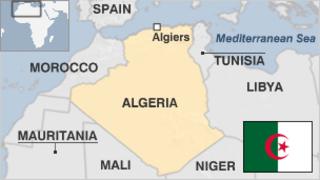Algeria profile
Algeria, a gateway between Africa and Europe, has been battered by violence over the past half-century.
There are conflicting reports about the death toll during the war against France for independence in the 1950s and early 60s. French historians estimate that up to 400,000 Algerians were killed, while the Algerian government says more than one million people died.
The country later endured a brutal internal conflict after when elections that Islamists appeared certain to win were cancelled in 1992; a low-level Islamist insurgency still affects Algeria.
The Sahara desert covers more than four-fifths of the land. Algeria is the continent’s biggest country, and is the world’s 10th largest.
Oil and gas reserves were discovered there in the 1950s, but most Algerians live along the northern coast.
FACTS
People's Democratic Republic of Algeria
Capital: Algiers
Population 41 million
Area 2.4 million sq km (919,595 sq miles)
Major languages Arabic, French, Berber
Major religion Islam
Life expectancy 75 years (men), 77 years (women)
Currency dinar
LEADER
President: Abdelaziz Bouteflika
Abdelaziz Bouteflika took power in 1999 and gained his fourth term of office in elections in 2014, despite doing no personal campaigning and rarely appearing in public after suffering a stroke in 2013.
He first took office when Algeria was still caught up in a savage civil war with Islamist insurgents, and is credited with curbing the conflict and restoring economic stability.
He amended the constitution in 2008 to remove the two-term limit on the presidency, effectively giving himself the option of remaining head of state for life.
Opposition politicians, former establishment figures and demonstrators called for his removal on health grounds, but he nonetheless announced that he would seek a fifth term at the April 2019 election.
Street protests after the announcement prompted President Bouteflika to postpone the April polls and withdraw his candidacy.
MEDIA
Algeria has a lively private press but the state broadcaster avoids criticism of the government.
Recent legislation allows several privately-owned TV stations to operate from Algerian soil, but none of them are opposition-leaning.
TIMELINE
Some key dates in Algeria’s history:
1830 – France seizes Algiers, ending Algeria’s three centuries as an autonomous province of the Ottoman Empire.
1939-1945 – The Collapse of France and the Anglo-American occupation of North Africa during Second World War encourages hopes for independence.
1945 – Pro-independence demonstrations in Setif. Thousands are killed in suppression of ensuing unrest.
1954-1962 – Algerian War of Independence.
1962 – Independence.
1976 – Algerian, Moroccan armies clash over Western Sahara.
1989 – New constitution removes the one-party state and moves country away from socialism to western capitalism.
1991-1999 – Civil war pitting Islamists against the government.
1999 – Abdelaziz Bouteflika becomes president, introduces national reconciliation policy.
2019 March – President Bouteflika’s announcement that he will stand for another term as president leads to street protests, prompting him to postpone the April polls and withdraw his candidacy.
Source: Read Full Article



